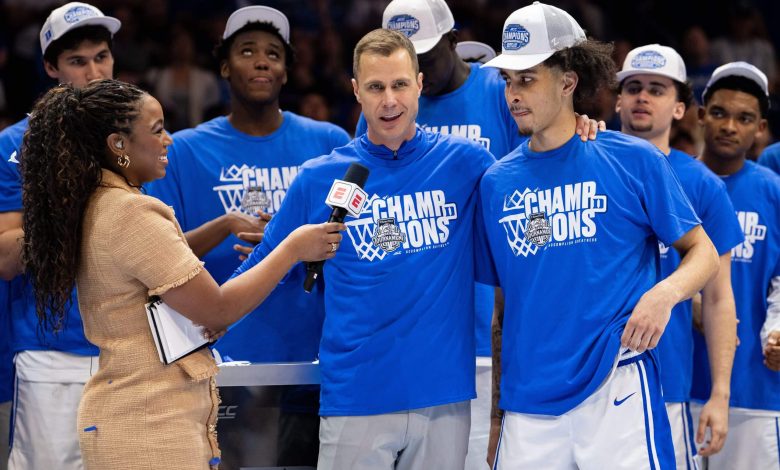Jon Scheyer of Duke demonstrated that he is already the best coach ACC basketball needs.

The Atlantic Coast Conference (ACC) has long been home to some of college basketball’s most iconic programs and coaches, from Dean Smith and Roy Williams at North Carolina to Mike Krzyzewski at Duke. For decades, Krzyzewski’s leadership transformed Duke into a powerhouse that won five national championships, earned numerous conference titles, and produced countless NBA players. His retirement in 2022 left a void that seemed nearly impossible to fill. However, in the relatively short time since Jon Scheyer took the reins as Duke’s head coach, he has demonstrated not only that he is the right successor to Krzyzewski but also that he is already the best coach ACC basketball needs moving forward.
The Weight of Expectations
Taking over a program like Duke is no small feat. The program’s long legacy, national prominence, and passionate fanbase come with high expectations. However, Scheyer was not an outsider inheriting a new job. He was a former player under Krzyzewski and had already built a reputation as a top-tier assistant coach before his promotion. Born and raised in Chicago, Scheyer was a standout at Duke, leading the team to a national championship game appearance in 2010. His deep understanding of Duke’s culture and its basketball philosophy made him the natural choice to lead the Blue Devils after Coach K’s retirement.
Duke’s basketball program, however, is not merely defined by its historical significance; it is also about consistently competing at the highest level. Scheyer entered the job knowing that the program’s success wasn’t just tied to its legacy but to the present and future. With the loaded talent that Duke consistently attracts, it was essential that Scheyer could maintain and even elevate the program’s success in a highly competitive ACC and national landscape.
A Smooth Transition: Scheyer’s Early Success
When Jon Scheyer was named head coach, many wondered how he would handle the transition from assistant to head coach. While his tenure as Krzyzewski’s associate head coach was certainly valuable, taking over a program with such a rich history presents challenges unique to each successor. Early on, Scheyer proved that his leadership, strategic mind, and ability to adapt to the modern college basketball landscape were exactly what Duke—and the ACC—needed.
In his first season (2022–2023), Scheyer managed to steer the Blue Devils to an impressive 26-9 record, finishing second in the ACC. Despite the initial pressure of taking over for an all-time coaching legend, Scheyer didn’t just maintain Duke’s standard of excellence; he began to shape the program in his own image. His work with players like freshman Kyle Filipowski, who emerged as a potential lottery pick in the NBA draft, demonstrated Scheyer’s ability to develop talent quickly and effectively.
What stood out in Scheyer’s first season was his ability to balance the pressure of expectations with a commitment to developing young talent. Duke has long been a program that attracts elite recruits, and Scheyer continued this tradition with the 2023 recruiting class. His ability to recruit top-tier players while fostering team chemistry and culture was critical in his early success as head coach.
Modernizing Duke’s Approach
One of the most exciting elements of Scheyer’s early coaching career is his willingness to modernize Duke’s approach. Under Krzyzewski, Duke’s basketball program had a reputation for playing a disciplined, defensive-oriented brand of basketball. While this was undoubtedly effective, the modern landscape of college basketball has changed dramatically. The rise of the three-point shot, positionless basketball, and an increasing reliance on analytics have forced coaches to evolve in their strategies. Scheyer has demonstrated an ability to not only adjust to these changes but also embrace them.
For example, in his first season, Scheyer’s teams showed a willingness to play a more up-tempo style of basketball, incorporating more three-point shooting and fast-break opportunities. This not only made Duke more dynamic offensively but also more adaptable to different styles of play, something that will be crucial as the program enters an era where scoring efficiency and versatility are paramount. Scheyer’s offense was efficient, and his ability to manage rotations and player roles allowed Duke to remain competitive in both the ACC and on the national stage.
In addition to a more modern offensive approach, Scheyer has also embraced the evolving nature of recruiting. With the advent of the transfer portal, recruiting has become an even more complex and year-to-year affair. Scheyer’s ability to tap into this new landscape was evident in his acquisition of several key transfers, allowing him to build a roster that was not only filled with high school talent but also experienced players who could contribute immediately.
Scheyer’s Leadership and Impact on the ACC
While Scheyer’s coaching acumen and strategy have been critical to his early success, perhaps the most significant aspect of his leadership is his ability to inspire and lead. The ACC is home to some of the nation’s top programs, including North Carolina, Virginia, Miami, and Louisville, among others. The competition within the conference is fierce, and the pressure to succeed is constant. Yet, Scheyer’s ability to navigate this competitive landscape has been remarkable.
Scheyer’s impact on the ACC extends beyond just his own program. Under his leadership, Duke has maintained its reputation as the standard-bearer of success in the conference. However, it’s not just about winning games; it’s about shaping the culture of ACC basketball. Scheyer brings a level of professionalism and modernity to the conference that is refreshing. His approach to coaching, recruiting, and player development has already set a new bar for excellence within the ACC.
Moreover, Scheyer has proven adept at navigating the dynamics of college basketball in the 21st century. The rise of NIL (Name, Image, and Likeness) rights, the importance of the transfer portal, and the ongoing shift towards player empowerment have all had a profound impact on the college game. Scheyer has demonstrated a keen understanding of these factors, adapting to the changing landscape without losing sight of the traditions and values that make Duke and the ACC special.
Long-Term Vision for Duke and the ACC
Looking ahead, Scheyer’s vision for Duke basketball aligns perfectly with the needs of the ACC. While Duke has always been one of the conference’s flagship programs, Scheyer has the potential to elevate the entire conference. The ACC needs a strong leader to continue its dominance in the national landscape, and Scheyer appears to be that leader. His ability to recruit at the highest level, develop players, and adapt to the changing nature of the game is exactly what the ACC requires to remain competitive in the years to come.
Scheyer’s leadership style is one that prioritizes building strong relationships with his players, fostering a team-first mentality, and emphasizing the importance of discipline and hard work. He understands that success in college basketball isn’t just about winning games; it’s about preparing young men for life beyond basketball. This holistic approach to coaching is something that resonates deeply with players, and it is one of the reasons why Scheyer has been able to earn the trust and respect of his players so quickly.
In addition to his on-court success, Scheyer’s ability to maintain Duke’s national prominence while navigating the changing landscape of college athletics is vital. As more programs invest in facilities, NIL deals, and recruitment efforts, Scheyer’s leadership will ensure that Duke remains not just a powerhouse but a model for how to adapt in an ever-evolving sport.









